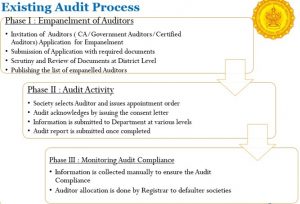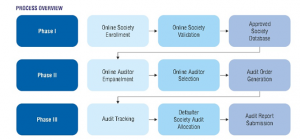Online Audit Management System
Cooperative Society Audit Process Overview:
- Department Login (DDR/AR/DJR/Commissioner):
- Auditor/Society Login:
- A good management and control of the societies in general is essential for their successful functioning.
- Auditors, therefore, act as custodian of the interests of stakeholders viz Shareholders, members, non-members, financing banks, the general public and the Government.
- Statutory Audit is mandatory every year.
- Audit is very critical activity to safeguard the interest of all the stakeholders.
- Entire Department is occupied in managing and monitoring Audit of cooperative societies.
- Manual auditing process is time consuming and inefficient resulting in lack of adherence to timely audit, less monitoring and compliance.
- On an average only 40% of cooperative societies get audited.
- Due to delay in auditing, the financial interests of stakeholders is at risk
Key Challenges :
- Redundant Efforts: Audit Information is collected at various levels leads to redundant efforts of administration. Lot of man-month efforts are wasted in coordination with stakeholders.
- No Real Time Information: Timely update is not available to administration to take appropriate action.
- Data Aggregation and Validity: Collection and aggregation of information is time consuming and inefficient.
- Poor Adherence /Compliance to Rules: Monitoring and adherence to rules is big challenge with given setup which leads to high % of defaulters among stakeholders.
- Reactive Decision making: Due to non-availability of required information in real time administration is largely works on reactive decision making.
- Spill over: Inspection and enquiry get delayed due to non/late submission of audit report/audit compliance report.

Application Objective:
- 100 % Audit Compliance of all cooperative societies across State
- To create Online repository Audit Reports
- To ensure the transparency by reducing the footfalls of stakeholders
- Reduction in Audit Defaulters year on year across the state
- Reduction in administrative efforts to ensure Audit compliance through coordination
- Reduction in paper usage.
- Efficient Administration of empaneled Auditors engaged in audit process
- Reduction in Redundant efforts
New Audit Process:




